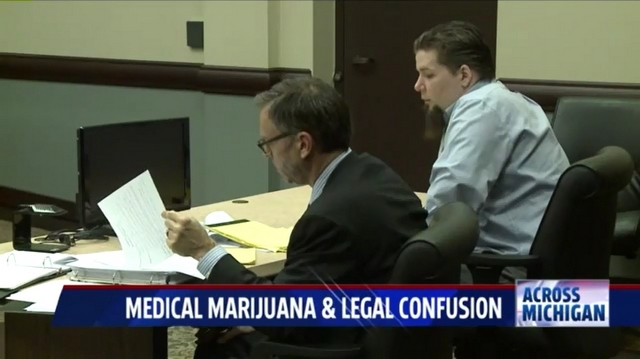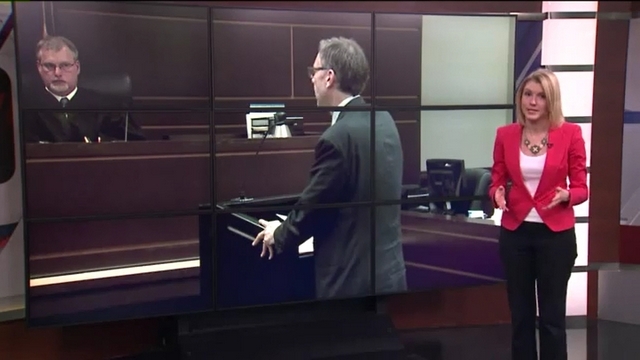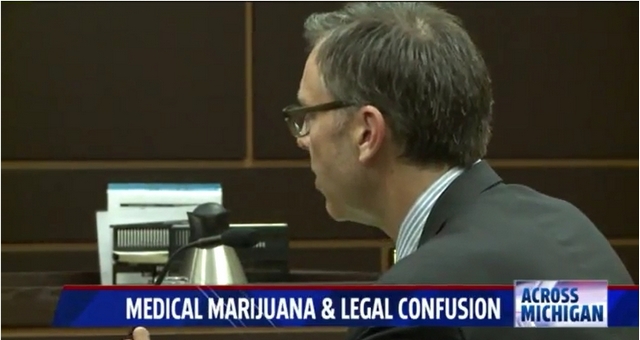
Aug 12, 2015 | Criminal Defense Attorney Michael Komorn, Komorn Law Blog, Marijuana Criminal Defense Attorney Michael Komorn, Medical Marijuana Attorney Michael Komorn
April 23, 2015 – In Western Michigan yet another Michigan Medical Marijuana patient is fighting for his freedom in a system of confusing laws. He is also fighting for the right to see his child all while the State of Michigan possibly destroys his family and financial future. Max Lorincz -unlike most who plead to the sometimes bullying tactics of the court system – is standing up for his right use the medicine recommended by a doctor.
The fly in the ointment in this case is that the marijuana was a concentrate and not what is described as usable in the Michigan Medical Marihuana Act.
The story has been covered by the Fox 17 News program. Below is some further information from the online website.

GRAND RAPIDS, Mich. – A Spring Lake father already served jail time and is due back in court for another felony charge of medical marijuana concentrates possession, despite having a medical marijuana card.
Max Lorincz told FOX 17 has suffered years of pain from a long list of ailments, including herniated back discs and severe celiac disease. Yet when he started to use prescribed medical marijuana edibles and concentrates, his pain faded.
Here’s the hook: even though Lorincz has a medical marijuana card and thought he was following the law, marijuana concentrates are not necessarily protected under the Michigan Medical Marijuana Act.
“When I got on the edibles, it was able to calm my stomach down enough and get things under control better than any medications they’d prescribe me,” said Lorincz.
Recently Lorincz was charged with felony marijuana concentrates possession. As he awaits court, the judge ordered him to be drug tested. Now he said he is forced back on powerful painkillers; pills Lorincz said make him feel like a zombie.
Under the current Michigan Medical Marijuana Act, “usable marijuana” is defined only as the dry leaves or dry flowers of the plant. Under its section four, users are protected to have up to 2.5 ounces of “usable marijuana,” Concentrates are not and according to the People v. Carruthers, don’t qualify for section 4 immunity.
Medical marijuana users can find defenses under section 8 of the act when they meet certain criteria. Prosecuting status quo tactics are usually stripping a defendant of their section 4 and section 8 immunity by any means therefore disallowing any reference of medical marijuana in a trial to a jury.
There is legislation pending that would amend the Michigan Medical Marijuana Act to include perhaps a more specific definition of “usable marijuana.” However, this House Bill 5104 has been hung up for months, after the Michigan Senate referred it to a committee last August.
Since seeing FOX 17’s coverage of Lorincz’s case back in February, Defense Attorney and President of the Michigan Medical Marijuana Association Michael Komorn took on Lorincz’s case pro bono. For the last six years, Komorn said he’s dedicated his practice exclusively to medical marijuana patient and caregiver representation.

But his case has come with some devastating consequences. In February Lorincz was charged with a two-year felony: possession of a schedule 1, controlled, synthetic substance. Schedule 1 is defined as a controlled substance that has no medical use.
Now his five-year-old son is taken away, and he is left with only supervised visits. All of this because Lorincz called 911 in September for a family medical emergency. The deputy who responded to the call found a smear of butane hash oil in his home. It’s a substance Lorincz ingests for what he called “deep pain relief,” and is something he obtained with his medical marijuana card.

“I’m outraged by it, it shouldn’t have happened,” said Komorn.
Komorn said medical marijuana is not a controlled substance. In fact, Michigan law states marijuana is a schedule 2 drug. Yet because Lorincz is charged with having a schedule 1 drug, and not specifically marijuana, Komorn said it is difficult to protect Lorincz under section 8 immunity of the Michigan Medical Marijuana Act.
Komorn believed part of the issue is a recent policy change in Michigan State Police Lab reporting.
“They had a policy change by why?” asked Komorn. “The policy changed. The motivation for it was if they report it this way, people like Max won’t be able to claim a medical marijuana defense.”
The lab technician in Lorincz’s case testified that he has been testing tetrahydrocannabinol, or THC, for 25 years. THC is the main psychoactive ingredient in marijuana, also present in synthetics. However, a recent policy change means the technicians have to write “origin unknown” when testing this type of THC on lab reports. The technician said he could not tell if the sample was synthetic or natural.
The prosecution argued Lorincz’s residue was not “usable marijuana,” as defined in the previous court case, People versus Carruthers; therefore, Lorincz should be bound over for trial. However, Komorn argued that a hash extraction comes directly from the resin of the plant.
Komorn said this lab policy change is the difference between a felony and no charge at all for Lorincz, stating he should be protected under the Michigan Medical Marijuana Act. Komorn asked the judge to dismiss it.
“(The lab technician) admitted that on the stand,” said Komorn. “That is very, very, very disturbing to me, because it means that the politics in the law are affecting the truth. That’s not how it’s supposed to be. We’re supposed to rely on science to make the case.”
For now Lorincz said he is following court’s orders and is back to taking what he calls debilitating prescription pain-killers.
Read More Detail From Fox 17 The Report Here
Also Check This Out
Prescription Pain Killers – Deaths Fall In States With Medical Marijuana

Aug 3, 2015 | Marijuana Criminal Defense Attorney Michael Komorn, Medical Marijuana Attorney Michael Komorn, Michigan Medical Marijuana Criminal Defense Attorney Michael Komorn, News
Three men will go to trial next month after police say they were growing large quantities of marijuana illegally. All are charged with delivering or manufacturing between 5 and 45 kilograms of marijuana, the equivalent of between 20 and 200 plants, as well as a generic charge of delivering or manufacturing marijuana.
The charges were filed following police raids on an alleged marijuana dispensary in Brighton Township and two homes, which authorities say were being used to grow marijuana.
The defendant’s attorneys have also questioned officers involved with the raid whether they were aware if their clients were registered caregivers and/or patients under Michigan’s Medical Marijuana Act, but were told by one DEA agent that didn’t matter as they were operating under a federal search warrant. Federal law doesn’t recognize state efforts to legalize marijuana, whether for medicinal or recreational use. (JK)

Jul 16, 2015 | Criminal Defense Attorney Michael Komorn, Marijuana Criminal Defense Attorney Michael Komorn, Medical Marijuana Attorney Michael Komorn, News
The Detroit police raided and made arrests at marijuana dispensary in an article in the Detroit Free Press from July 14, 2015.
Detroit police arrested two people and confiscated two firearms and drugs during a raid on a marijuana dispensary Tuesday afternoon.
Police seized 4,100 grams of marijuana (about 9 pounds), and removed 12 edible marijuana foods from the shelves at Detroit Medz, said Sgt. Cassandra Lewis of Detroit police Media Relations.
According to state law, only Michiganders who possess state registry cards can legally use medical marijuana, but at the shop “they were just selling to anybody who walked in,” she said.
Detroit does not have an ordinance regulating dispensaries. Detroit police favor having dispensaries be regulated, “so that it’s safe not just for the customers but also for the community,” Lewis added.
A local ordinance, spelling out what Detroit authorities expect of the city’s dispensaries, would protect legitimate operators and weed out any that are undesirable, added Southfield attorney Michael Komorn, president of the Michigan Medical Marijuana Association.
But without such regulation in place, Tuesday’s raid was ill-advised because Detroit police should focus on violent crime – not dispensaries, Komorn said.
“I can’t speak to this specific location, but there’s a lot of dispensaries operating in Detroit and it’s unfortunate that Detroit’s leaders and citizens seem to be at odds about whether they should be there. Some people still see medical marijuana as just dope,” he said.
“These places are not causing lawlessness and they’re not hurting property values in the city,” Komorn said.
Some law enforcement agencies claim all dispensaries are illegal until the state Legislature passes a law allowing them. State Attorney General Bill Schuette agrees with that assessment.
The city of Detroit is overdue for regulating its fast-spreading dispensaries, said Winfred Blackmon, a community leader in northwest Detroit who is outspoken about medical-marijuana commerce.
Read the article here Detroit Free Press Article – Detroit Dispensary Raid

Jun 18, 2015 | Criminal Defense Attorney Michael Komorn, Marijuana Criminal Defense Attorney Michael Komorn, Medical Marijuana Attorney Michael Komorn, Michigan Medical Marijuana Criminal Defense Attorney Michael Komorn, News
On November 8th, 2008, by a majority of 63 percent, the citizens of the State of Michigan voted into law the constitutional initiative, Initiated Law 1 of 2008, ratified into law December 4, 2008, herein referred to as the Michigan Medical Marihuana Act, MCL 333.26421 et seq. (the “MMMA”).
The voters of the State of Michigan, who at that time had no reason to believe a need to prevent misconstruction, misinterpretation, or abuse of its intent, upon this day declare that certain basic rights afforded all the citizens of Michigan are not being recognized for the medical marihuana community, to the extent that the following rights must be decreed, declared, recognized, and adopted, as the
Michigan Medical Marihuana Patient Bill of Rights
All patients possess the following rights, without limitation:
- There shall be a presumption that registered patients and their caregivers are in compliance with the MMMA.
- The right to be treated reasonably, with dignity and respect, by law enforcement and the government, and by the medical community and private business in general. “Reasonable” should be based in part upon the best available medicine and science, and not upon emotion or politics.
- The right to be protected against arrest, prosecution, or any penalty.
- The right to be free from searches, seizures, and forfeiture.
- The right to equal protection under the law.
- The right to privacy, of any and all information related to patient or caregiver status.
- The right to the best medical care, and to the best medication in the proper delivery form, to treat their condition, disease, or debilitation.
- The right to safe, immediate access to a continuous supply of medication to treat their condition, disease, or debilitation, and the right to a choice of where to obtain that medication.
- The right to equal employment.
- The right to equal and fair housing.
- The right to be protected from denial of custody or visitation of a child.
- The right to speak, the right to remain silent, and the right to counsel.
- The right to civil remedies and punitive damages against those who violate any of these rights.
- The right to prosecute those who violate the protections of the MMMA.
- The right to protection under the Victim Rights Act of Michigan.

May 18, 2015 | Criminal Defense Attorney Michael Komorn, Marijuana Criminal Defense Attorney Michael Komorn, Medical Marijuana Attorney Michael Komorn, News
The Michigan Legal Advisor News Letters.
Read the current newsletter from Michigan’s #1 Medical Marijuana Defense Attorney Michael Komorn.
KOMORN LAW NEWSLETTER ISSUE #1 May 2015
Michael Komorn is recognized as a leading expert on the Michigan Medical Marihuana Act. He is the President of theMichigan Medical Marijuana Association (MMMA), a nonprofit patient advocacy group with over 26,000 members, which advocates for medical marijuana patients, and caregiver rights. Michael is also the host of Planet Green Trees Radio, a marijuana reform based show, which is broadcast every Thursday night 8-10 pm EST. Follow Komorn on Twitter.


Nov 19, 2014 | Marijuana Criminal Defense Attorney Michael Komorn, Planet Green Trees Radio
The best resource for everything related to Michigan medical marijuana with your host Attorney Michael Komorn. Live every Thursday evening from 8 -10 pm eastern time.
A legal discussion with attorneys John Targowski and Bruce Block exchanging ideas on current court cases and other issues. Also Defense Attorney David Rudoi will be in the studio to join to the discussion.
Also, John Evans will discuss the dissolution of the MMMP panel responsible for recommending more qualifying conditions- what has happened and what is expected next? John will be accompanied by PTSD sufferer Larry David Sr. and author of the book ‘The Marijuana Smugglers Guide’.
We will talk about AG Bill Schuette’s most recent legal opinion letter
concerning cannabis and Child Protective Services, as well as
pending legislation that may affect patients and caregivers and the
Medical Marihuana Program.
If you or someone you know is facing charges as a result of Medical Marijuana prescribed to you as a Medical Marijuana patient under the Michigan Medical Marijuana Act, contact Komorn Law and ensure your rights are protected.
Michael Komorn is recognized as a leading expert on the Michigan Medical Marihuana Act. He is the President of the Michigan Medical Marijuana Association (MMMA), a nonprofit patient advocacy group with over 26,000 members, which advocates for medical marijuana patients, and caregiver rights. Michael is also the host of Planet Green Trees Radio, a marijuana reform based show, which is broadcast every Thursday night 8-10 pm EST. Follow Komorn on Twitter.










